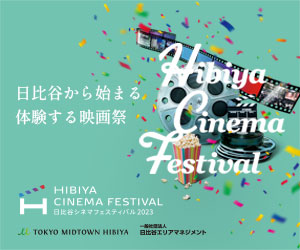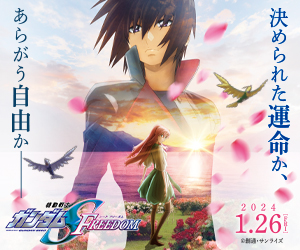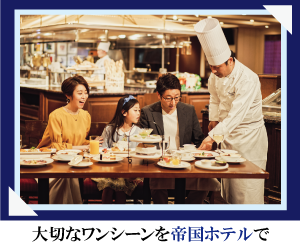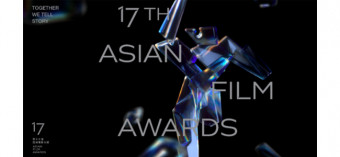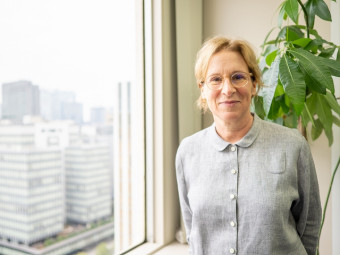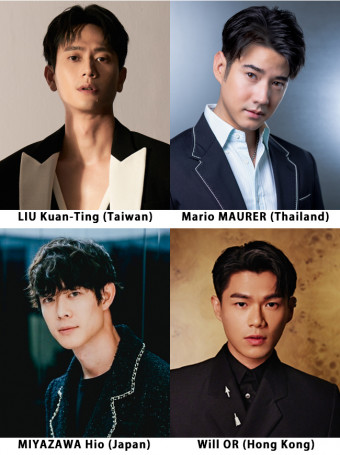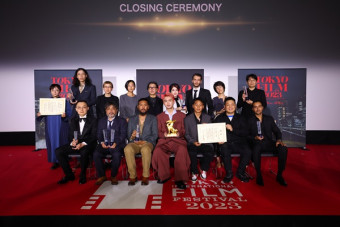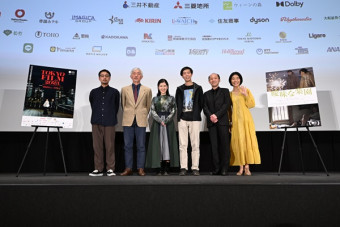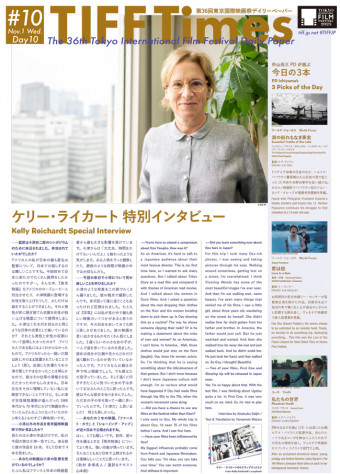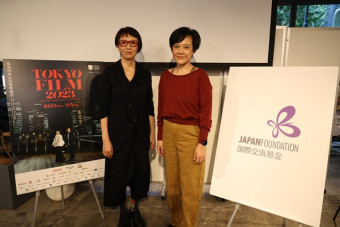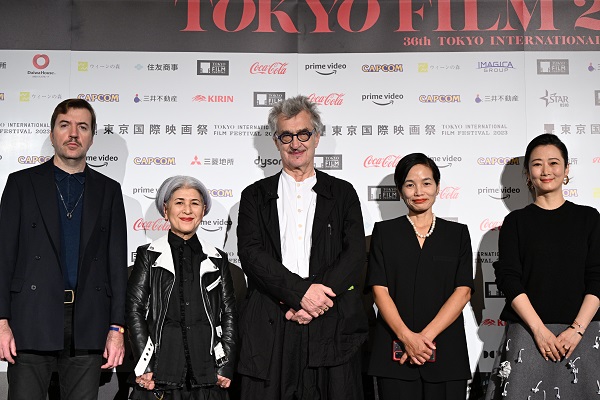
The five members of the 36th Tokyo International Film Festival International Competition Jury sat down with the press on October 24, the morning after they’d first appeared together on TIFF’s opening night.
The all-star panel is presided over by internationally renowned German filmmaker, writer and photographer Wim Wenders (Paris, Texas, Wings of Desire, 36th TIFF Opening Film Perfect Days) with Spanish filmmaker Albert Serra (Story of My Death, La mort de Louis XIV, Singularity), Chinese actress and producer Zhao Tao (as actress: Still Life, Io Sono Li/Shun Li and the Poet, Ash Is the Purest White; as producer: Useless, Swimming Out Till the Sea Turns Blue), Vietnamese producer Tran Thi Bich Ngoc (Big Father, Small Father, and Other Stories; The Third Wife, Glorious Ashes) and Japanese producer KUNIZANE Mizue (Adrift in Tokyo, Guilty of Romance, Plan 75).
Wenders greeted the assembled press with a rousing “Ohayo gozaimasu! (Good morning). I feel this is a very prestigious jury, and I’m happy to be one of them. Maybe I’m called Jury President, but I feel like I’m an equal members of these five. For me, this is a return to TIFF. I was Jury President for the first time 30 years ago. Along with my experience on juries at Cannes and Venice, it was among the best times I’ve ever spent at festivals. I’m looking forward to educated, cultivated discussions, and to watching these 15 films with them.”
Said Zhao, “I’m very honored to be a part of this jury panel. I look forward to watching the 15 films together. It’s very nice to have this chance to study and to learn. I say that because, by seeing the work of the directors and their crews, I will learn about life in other countries.”
Tran commented, “Even in my imagination, I [never thought] that I would be back here again so soon. Last year I was here with a film (Glorious Ashes) and I’m so honored to be part of the jury this time. I look forward to having a great experience watching the diverse cultures, unique stories and high-quality cinema language in these 15 films. I admire the work of this jury very much, and I look forward to this experience with them.”
Kunizane, the lone Japanese representative on the panel, admitted: “I’m still asking myself how I’m allowed to play such a huge role. It’s quite nerve-wracking. At last night’s opening party, I met so many international guests and they asked me how many times I’d participated in TIFF. They were surprised to hear that I’ve been here from the first edition. I look forward to the wonderful experience of watching these films. I’m very honored.”
Said Serra, “It’s a real pleasure to be here. For a filmmaker, the main reason to be on the jury is to see films made by others, to learn from them, to see what’s happening around the world and to experience great adventures. I think it’s much more rich to watch films in this way.”
Not surprisingly, the press directed many of their questions to the illustrious jury head.
An Indian journalist, drawing comparisons between Wenders’ TIFF Opening Film Perfect Days and Kurosawa Akira’s Dersu Uzala, wondered if the auteur saw any parallels himself. “It’s an honor to be mentioned in the context of Kurosawa and Dersu Uzala,” said the German helmer. “But he made films mostly in Japan; I’m a traveler and make films all over the world. For this film, I was submersed in Japanese culture and it was a sheer pleasure. But I don’t want to compare Perfect Days to other films, because although I’m honored, I think every film escapes comparison.”
Asked if he remembered his first visit, Wenders recalled, “I remember exactly. It was summer 1977, on an invitation for a week of German films being shown by the Goethe Institute. I went to the Japanese Film Center (now National Film Archive Japan) and used my time watching as many films by Yasujiro Ozu as I could see. I was alone, without an interpreter, watching on a table and there were no subtitles. At the end of the week, I felt I could speak Japanese and I felt at home.”x
Queried what he’s looking forward to watching at TIFF, Wenders said, “I feel very excited. As I’m relatively jet-lagged, I think I’ll put all my attention on the 15 Competition films. I won’t have time to see much else. After we finish, I hope I’ll have time to meet my friends and my Perfect Days crew. But I feel an obligation toward this jury and this festival, so I will be very single-minded.”
Asked if he found differences between the TIFF he’d experienced 30 years ago and now, Wenders responded, “Thirty years ago was a different age. All the films we saw were shot on film stock and because my jury was watching only first films, each film was a discovery. It was an extraordinary time and we felt we were seeing new faces from different countries. It was still the age of innocence. In today’s digital age, a new age, and I can’t tell you how curious I am to see these films, and how the state of the art in cinema has changed.”
In the perennial question from the media covering the festival, the panel was asked what TIFF could do further to become a truly international film festival. Zhao added some perspective: “There are many film festivals around the world every year,” she said. “At each festival, it’s necessary to showcase different films. The important thing is for the festival to have a direction and for the selected directors to express their own visions.”
Said Serra: “If the question is how TIFF could be more international, the answer is quite obvious: invite more international people and fewer local people. But it’s not so easy, there aren’t that many good films to fill all these festivals. And for a Class A festival, all the films have to be premieres. But there’s always a chance to make discoveries.”
Tran commented, “I think COVID really helped me realize that having a physical festival is so important. I was almost in tears last night just because of the power of the big screen. I think in Asia, TIFF is one of the most important festivals. Some Vietnamese films became known through this festival, and it prompts us to make good films so that they’re selected. This is how we get connected to the world through cinema.”
Kunizane added, “A lot of people are watching films online rather than the theater. I don’t want everyone to forget how wonderful it is to watch movies in the theater. In Japan, a lot of people admire overseas festivals like Cannes, Venice, Berlin. But this year’s post-COVID festival is really terrific. I hope young people will come to TIFF and experience these films. And I also think TIFF contributes to the development of Japanese films.”
“TIFF is definitely one of the great world festivals,” concurred Wenders. “I’ve been observing and following it from a distance through the years. Although I’m not in a position to comment on the Opening Film, I will say that the red carpet was beautiful, and I thought that was a good beginning. I’ll be able to give a more educated answer at the end of the festival.”
Finally, the panel was asked what they will each look for in judging the films. Serra, calling himself a “curious case,” said, “For me, I’m only interested in something that is interesting for my own creative work, otherwise I get bored. That’s what I always look for.”
Kunizane admitted, “I haven’t studied the techniques of filmmaking in detail, but for me, it’s about being surprised or shocked. That’s how I will make my decisions.”
Tran said, “I will watch with a fresh mind. I want to see films that touch me emotionally and see the intelligent ways in which the directors use cinema language.”
Noted Zhao, “Just before coming to TIFF, I was at the Pingyao International Film Festival in China and I had the pleasure of seeing 10 films. I love watching films and look forward to what the directors want to convey. Through films, we’ll make discoveries and have new experiences. Being moved is also very important.”
Wenders recalled, “A long time ago, I worked as a critic and wrote a lot about movies. My approach hasn’t changed. I like discovering a personal handwriting in a film, and how the filmmaker found ways to express, emotionally and physically, his or her view of the world. I like the individual expression.”
International Competition Jury Presser
Jury Members:
Wim Wenders – President of Jury (Filmmaker/ Writer/ Photographer)
Albert Serra (Filmmaker),Kunizane Mizue (Producer), Tran Thi Bich Ngoc (Producer), Zhao Tao (Actor / Producer)














